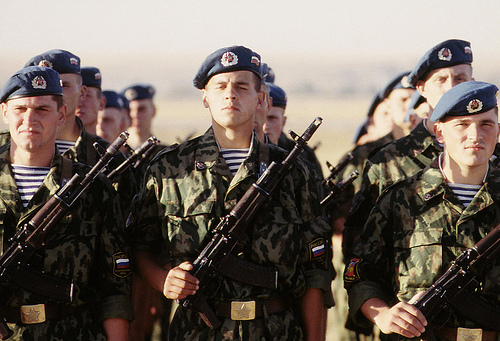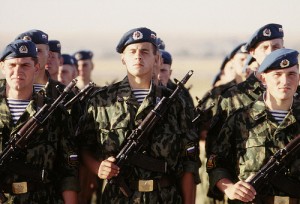
Russian Airborne Forces in Fort Carson, Colorado
Armed Russian paratroopers have been reported in Colorado. Fortunately, this is not a scene from Red Dawn come to life, but rather the most recent example of the US-Russian ‘Reset’. A detachment of Russian Airborne Assault Forces are presently in Fort Carson, Colorado participating in the first ever joint anti-terror exercise with U.S. Special Forces on American soil.
This exercise is the most recent in a growing list of ‘firsts’ and tangible successes in US-NATO-Russian relations and emblematic of the increased cooperation spurred by the ‘Reset’.
On May 4, 2011, the NATO-Russia Council’s Consolidated Glossary of Cooperation was signed in Brussels. The document contains over 6,000 terms and covers key areas of NATO-Russian political and military cooperation. NATO Military Committee spokesman Massimo Panizza called the glossary “the fruit of ten years of diplomatic work.”
In June 2011, Russia participated in the 12-day “Bold Monarch” naval exercise. This was the first time a Russian submarine has ever participated in any NATO exercise.
Also in June 2011, “Vigilant Skies” took place in Warsaw and Moscow. This was the first live NATO-Russian counterterrorism exercise that involved Russian and NATO fighters practicing drills for intercepting hijacked planes. These exercises were also a first for utilizing a common airspace monitoring system providing a shared NATO-Russian radar picture of air traffic. This system was designed to increase communication and information sharing for joint responses to terrorist threats. A similar anti-terrorism exercise called “Vigilant Eagle” was conducted in 2010 with the Russian Air Force, NORAD, and U.S. Northern Command.
In October 2011, U.S. and Russian naval vessels participated in another bilateral anti-terrorism exercise code named “Pacific Eagle” near the Mariana Islands. The exercises included the simulation of U.S. and Russian ships liberating a vessel seized by terrorists, search and seizure drills, gunnery and maneuvering exercises, practicing division tactics, and the exchange of liaison officers. Commander Brian Mutty, the commanding officer of the participating USS Fitzgerald, remarked that “The training evolutions completed together will benefit both navies at sea when conducting anti-terrorism and counter-piracy operations.”
Unfortunately, the ‘Reset’ has also had its share of complications, especially on larger macro-level issues related to international policy and national security. Divisive issues such as Libya, Syria, Iran, and missile defense have strained and tested the ‘Reset’.
However, these complications in US-Russian relations are primarily derived from differing national interests, which are in turn further convoluted by domestic politics. The success of the ‘Reset’ is not dependent upon perpetual agreement, but rather by the nature of dialogue and the willingness to cooperate. While it may be difficult to not focus on the present obstacles straining US-Russian relations, there is certainly a benefit from taking note of the successes achieved and remembering just how far things have progressed.








[…] Painter: Russian Airborne Forces in Fort Carson, Colorado […]
… [Trackback]…
[…] Read More: americansecurityproject.org/blog/2012/russian-airborne-forces-in-fort-carson-colorado/ […]…